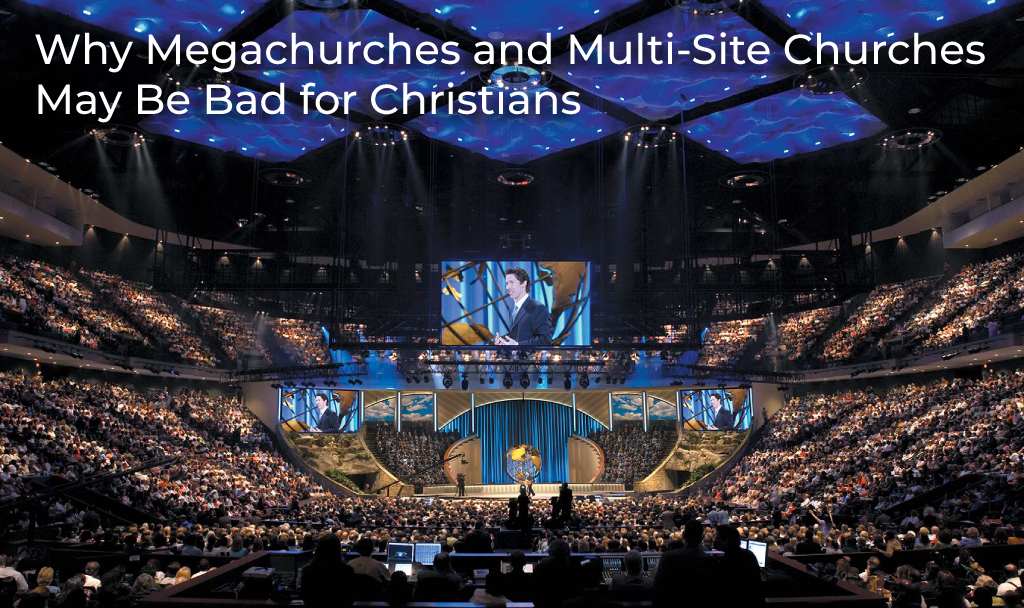
The growth of megachurches and multi-site churches has been a significant trend in the Christian church in recent years. They have garnered loads of attention from every corner of the church world, and have had positive, mixed, neutral, and negative responses from people for all sorts of reasons.
I personally attended a non-denominational church for many years that in certain ways could be considered both a megachurch and a multi-site church. You know what? I had some good experiences with it. But as I grew as a believer, I quickly found limitations, and some of those limitations morphed into issues that may have eventually led me to exit this church, had I already not been moving away geographically at the time anyway.
I will attempt to be fair and not engage in emotionally-charged bashing, but list out items that have been of general concern to both ex-attendees and outsiders of megachurches and multi-site churches, and do it in a gentle, loving, but still honest way.
But first, let me define some things here. Just what exactly do I mean when I’m writing about megachurches and multi-site churches?
What is a Megachurch or Multi-Site Church? What is the difference?
A megachurch is a large, usually Protestant, Christian church that typically has a weekly attendance of 2,000 or more. They can be part of well-known, established denominations, but non-denominational megachurch venues are increasing more in number. Megachurches are known for their size, dynamic worship services, and extensive programs and facilities. They are often led by charismatic pastors and feature a wide range of activities, including youth programs, small groups, and missions.
A multi-site church (sometimes referred to as satellite churches, for the locations that are an extension or a satellite branch of the “primary” or “main” church location), the other hand, is a church that has multiple locations, with each location having its own worship service, leadership team, and programming. The multiple locations of a multi-site church are typically connected by a central leadership and often share resources, main sermon teachings, and vision. In the case of the one I had attended, there was a live worship band, but when it came time for the central sermon, we watched a live video feed on a screen from the head campus of the church. Multi-site churches are often a response to rapid growth and a desire to reach more people in a particular region or community.
Both megachurches and multi-site churches can overlap in many ways, including having the “main” or “central” location of a multi-site church being massive in size, qualifying it as a megachurch. The two types can also share a progressive vision of teaching, can be led by popular, charismatic pastors, and possess loud, dynamic, musical worship teams, and other similarities.
Both megachurches and multi-site churches can overlap in many ways, including having the “main” or “central” location of a multi-site church being massive in size, qualifying it as a megachurch. The two types of churches are part of a broader trend towards larger, more centralized, and centrally-led Christian churches. These types of churches are often seen as providing a dynamic, engaging worship experience, can be led by popular, charismatic pastors, and offer a wide range of programs and services to meet the needs of their members.
So, What is The Big Deal with Them?
While these churches offer many benefits and attract large numbers of people, there are also concerns about the impact that these churches can have on the larger Body of Christ as a whole. Here are several reasons why megachurches and multi-site churches can be bad for Christians.
A Focus On Numbers Over Substance
Mega-churches and multi-site churches often prioritize growth and numbers, and utilize worldly methods and techniques to tell in non-believers and newer believers instead of simply having a humble, experienced pastor preach whole passages out of the Bible with no fanfare. This numbers-over-substance approach can lead to a focus on flashy entertainment and marketing over substance and depth. This can result in a shallow, consumerist approach to faith that lacks the depth and richness of Biblical teachings and practices. The worship segment of a Sunday service can resemble a pop concert with multi-million dollar lighting and sound systems and fog machines, often detracting the attendees’ attention away from God.
Instead of catering to attracting the masses with worldly entertainment, these larger, showier churches should do what Pastor John MacArthur stated, and “Cut the music. Turn on all the lights , [and use] normal light bulbs, please. Have a man stand in front of them and preach the Word. Try and sell that. See how many come back next Sunday.”
A Lack of Community
Megachurches and multi-site churches can be impersonal and lacking in close community relationships. In many cases, they can be too large to foster the kind of close relationships and community that are essential for spiritual growth and support.
One of my personal issues was a lack of one-on-one interactions with people in my aforementioned, previous church. Going to any of the weekend services was like walking into a giant, darkened movie theatre. It was hard to see anyone else, since the lights were focused on whoever was up on stage, and once the service was over, the hundreds of attendees rapidly piled out of the doors to go home. There was very little conversation and very little closeness.
A Lack of Accountability
The sheer size of megachurches and multi-site facilities can make it difficult for leaders to be held accountable for their actions and decisions. This can result in a lack of transparency and an environment where ethical and moral standards are not upheld. And that ties into the next point somewhat…
Who Runs These Churches?
The entire operation or multi-site and megachurch enterprises are so massive, and often the church polity (church government or organizational structure) is so convoluted, that it’s frustrating to attempt to communicate, or even know how to communicate, to those who make the decisions. It can be just as difficult as contacting the major executives of a major business corporation. Or the head/lead pastor is the head honcho and calls the shots, making it impossible for the average church-goer to have any access to him. Instead of these models, why not have an easier-to-access biblical model of a plurality of elders and deacons running things?
A Focus on Celebrity Pastors
Many megachurches and multi-site churches focus on a single charismatic pastor as the central figure, elevating them to the status of a celebrity. This can result in a culture where the pastor’s personality and charisma are more important than the teachings of the Bible and the guidance of the Holy Spirit.
A Focus on “Seekers” and Non-Believers
Much has been said about the “seeker-sensitive” movement that’s invaded the evangelical world in the past two decades. Megachurches and multi-site bodies often employ clever tactics in an effort to draw newer Christians and those who are supposedly seeking out spirituality in some way. They will often add coffee bars, gargantuan video displays and sound systems, and modern, concert-caliber worship sessions in their church building to wow the crowds. Yes, admittedly, sometimes there is nothing wrong with these elements if used tastefully.
What perhaps is most dangerous is a softening of the message preached and taught from the pulpit in seeker-friendly churches in order to sound less harsh on non-believers’ ears. The Gospel is often watered down or barely brought up at all. The topics of hell, judgment, and sin are rarely ever mentioned. And the Word of God is frequently used only to back up the main points of a friendly, feel-good, human-centered sermon that resembles a Christian-flavored TED Talk than it does a deep, Spirit-led expositing of Holy Scripture where God and Christ are the focal points. And when it does touch on real, godly, Bible-centered talk, the sermons don’t plunge deep and carve out the meat of the Word, leaving the veteran church attendees to get only a few drops of spiritual milk every now and then.
In a godly, biblical, New Testament church, the sheep should never be malnourished while the goats are being fed.
They Are Often Lax on Secondary Biblical Issues
A lamentable aspect of some larger churches is compromise on certain biblical matters and standards, such as allowing women to become pastors and elders. While it’s true that many smaller church locations (especially the liberal mainline churches) can relax on these same issues, megachurches often will go against clear, biblical teachings on these topics in an attempt to remain “hip” or “relevant” in a changing culture in order to bring in – and retain – the unlearned masses of people.
It’s important to note that not all megachurches and multi-site churches have these problems, and there are many examples of these types of churches that are thriving and have a positive impact on their communities. However, it’s essential to be aware of the potential pitfalls of these types of churches and to make informed decisions about where to worship and grow in one’s faith.
In conclusion, megachurches and multi-site churches have the potential to be bad for today’s followers of Jesus due to emphasis on numbers over substance, a lack of community, a lack of accountability, a focus on celebrity pastors, a focus on seekers and unbelievers instead of a focus on feeding the sheep, and compromising on biblical issues. While these churches can offer many benefits and attract large numbers of people, it’s important to be mindful of these potential drawbacks and to make informed decisions about where to worship, fellowship, and learn what it truly means to be a disciple of Jesus Christ.

3 Comments
Amani Moses
Thanks Scott, great article – well balanced..
I share your experiences and concerns.
Without CHRIST being the centre, without the preaching of unadulterated WORD of GOD and without the guidance and the lordship of the HOLY SPIRIT – our services are downgraded to entertainments.
Blessings to you.
Zach
This has been our struggle! Don’t get me wrong, I absolutely LOVE a strong worship team. I don’t like when they focus on one person (specifically with a stage light) but, I feel like we are truly only getting drops of biblical milk! The only other church that we often frequent, has a much older school worship team, borderline hymnals (nothing wrong with that, just not my jam) but they tend to bring up politics to much. The main pastor also tend to act like he’s “king of the castle” instead of a shepard of the flock.
Becky White
Yes! This article articulates exactly what my husband and I have been trying to express. Thank you for taking the time to break this down and explain the problems with the all-important Biblical backdrop.